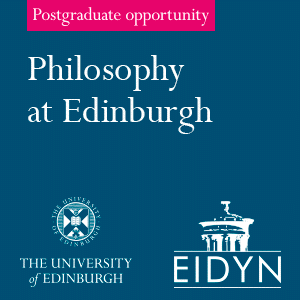Mini-Heap
Monday Mini-Heap…

- “There isn’t a lot of room in philosophy—analytic philosophy—for somebody who wants to do something that has some kind of aesthetic value” — Barry Lam (Vassar) is interviewed at The Public Life of the Mind
- “It seems worth exploring ways to boost the philanthropic sector whilst avoiding the potential downside of concentrating power in the hands of the ultra-wealthy” — Richard Yetter Chappell (Miami) has an idea: charity vouchers
- Letter to a young black philosopher — observations and advice from Liam Kofi Bright (LSE)
- Text-reading algorithm uses word-association analyses of scientific works to predict ideas humans missed — “In one experiment, researchers analyzed only papers published before 2009 and were able to predict one of the best modern-day thermoelectric materials four years before it was discovered in 2012” (via Gregor Flock)
- Update on the philosophy teacher accused of trying to set fire to St. Patrick’s Cathedral — he will be undergoing psychiatric evaluation
- An art exhibit all about Chinese philosopher Laozi opened earlier this week in Cairo — with more than 30 works by 40 artists from 18 countries
- The New Statesmen apologizes to Roger Scruton for not accurately representing his views — at the bottom of the linked article (via David McPherson)
Mini-Heap posts appear when 7 or so new items accumulate in the Heap of Links, the ever-growing collection of items from around the web that may be of interest to philosophers.
The Heap of Links consists partly of suggestions from readers; if you find something online that you think would be of interest to the philosophical community, please send it in for consideration for the Heap. Thanks!



In the relevant scholarship, “Laozi has come to be thought of as a largely fictional [hence mythical] figure” (Livia Kohn). Thankfully, Daoist ideas are no less significant in the historical absence of this “philosopher.” (Does this make caricatures all the more appropriate?!)
The New Statesman apology to Scruton, published by joint agreement with Scruton (and, one assumes, negotiated with lawyers under Britain’s libel laws), says:
Sir Roger is quoted accurately in the article: “Anybody who doesn’t think there’s a Soros empire in Hungary has not observed the facts.” However, the article did not include the rest of Sir Roger’s statement that “it’s not necessarily an empire of Jews; that’s such nonsense”. We would like to clarify that elsewhere in the interview Sir Roger recognised the existence of anti-Semitism in Hungarian society.
It is true that Scruton said the second quoted statement. He also said, in the interview:
The Hungarians, what I said in the speech that people quote from was, is true. I said there’s a legacy of anti-Semitism in Hungary which you can’t deny. You have to recognise that if you’re going to form any kind of coherent idea of what Hungary is as a nation. It has a large Jewish population who’ve got to be included and this was one of the great strengths of the Austro-Hungarian empire, that it gave to the Jews a sense of national identity as well as their ethnic and religious identity, and that’s what’s in danger of being lost because of the Nazi takeover and then the Communist takeover, which was also all part of that. So you should never ignore the possibility of anti-Semitism and the situation of the Jew in Hungary if you want to have a nation state. And I think Viktor is aware of that. He’s done a lot, with Holocaust memorials and all that sort of stuff, to include Jews in his particular form of national politics, but it’s not surprising that they don’t necessarily want to be included. And it’s not surprising if they join up with Soros’s transnational campaign against Orbán. It’s such a complicated matter.
So, after denying that he meant that Soros’s “empire” was “necessarily an empire of Jews,” Scruton went on to say that Hungarian Jews refused to be part of the Hungarian national politics that he supports and instead “join[ed] up with Soros’s transnational campaign against Orbán.”
The claim that Hungarian Jews reject Hungarian national politics for a transnational campaign led by a man who is the constant target of antisemitic conspiracy theorizing invokes antisemitic tropes of dual loyalty and international conspiracy.
And of course the context is defending Orbán from accusations of antisemitism; but Orbán consistently promotes antisemitism. One two three four links.
From the fourth link, Orbán said during the 2017 campaign, “We are fighting an enemy that is different from us. Not open, but hiding; not straightforward but crafty; not honest but base; not national but international; does not believe in working but speculates with money; does not have its own homeland but feels it owns the whole world.” This quote is basically antisemitic trope bingo.
From the first link, when Orbán’s State Secretary was challenged on the attacks on Soros, “He ended up answering that the ads were needed to prevent Soros from flooding Europe with Muslim migrants.” This is the exact US counterpart of the theory that Jewish organizations are flooding the US with immigrants, which led a terrorist to murder people at my former synagogue.
When Scruton was being discussed here before, I said that in this interview he “showed himself utterly insensitive to antisemitism.” The statement from the New Statesman gives me no reason to reconsider this. (It wouldn’t, since my original assessment was based on the unedited interview, not on Eaton’s article.)